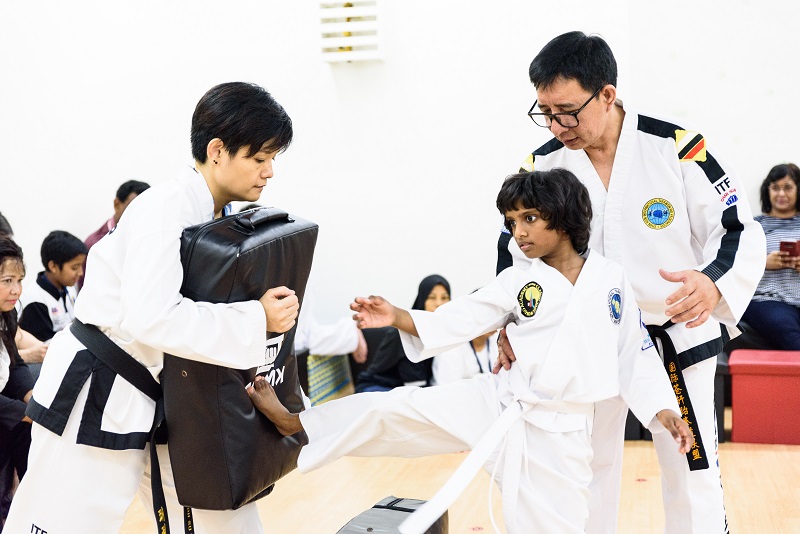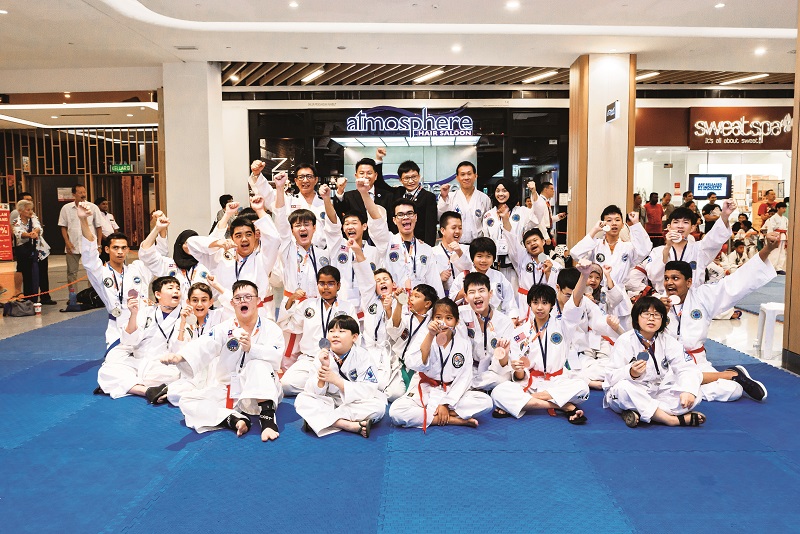
Khaldun (left) and SEN instructor Eric Khoo with Soh Jing Kai, 15. The red belt student, who has microcephaly, has been with the academy since he was 10. (All photos: Owen KC)
“Please take my son.” This plea by the father of an autistic child set Mohd Khaldun Redza on a course he never imagined pursuing — martial arts therapy. The chief instructor of SEN Master Academy remembers how it all started in 2010.
“One day, a couple walked into my taekwon-do class with their son, who was about eight and seemed to be in his own world, and asked, ‘Can you teach him?’ I told them I couldn’t because I did not have the knowledge or skill. But they came back every week and the reserved boy would sit and watch. And they kept persuading me.”
Persuasion and empathy — “I have a special needs son too and I know what it’s like. They can be aggressive sometimes.” — finally won Khaldun over and he took Afif Zahiruddin Rohaizan on. “‘Maybe with love and care we can guide him,’ I told my wife.”
Over time, the boy became more sociable and independent. He gained muscle strength and his cognitive and motor skills improved. “Eventually, he became my first special needs black belt student in the country. He’s 20 now and studying fine arts at UiTM.”
While Khaldun was making headway with Afif, his own son was doing poorly in school: Muhd Syamdzir Haqimi could not talk and had difficulty getting along with others. Concerned but busy being the sole breadwinner, he wrote to a child development specialist in Australia to ask what he could do. Her reply was simple: You are your son’s best educator and director.
dsc_8215_a.jpg

That hit home and Khaldun signed up for a diploma course in learning disorders management from College of Allied Educators Singapore, in Kuala Lumpur. Studying was tough for the then 52-year-old advertising agency account director, but he buckled down and came out top of his class. “My classmates were all young ladies, except for another gentleman, trying to learn child upbringing!” Heartened, he then took an advanced professional diploma in learning disorders and child psychology from Open University Malaysia and graduated in 2015.
It then struck him that he could incorporate the exercises, principles and values of taekwon-do, which he started learning in school at 14, into some of the therapies and education programmes he had been taught. So he began doing that with Muhd Syamdzir and another student with Down Syndrome at a friend’s centre. This soon led to the idea of having his own academy, which Khaldun set up in 2016.
The timing was right — he was about to leave his job — so he pumped his savings into SEN. “It was a leap of faith because we didn’t know whether people would accept [the concept] or respond to it. We just went in with good intentions and some experience, developed our programme and grew from there.”
SEN is the acronym for special educational needs while Master denotes martial arts therapy. The academy now has about 70 students aged between six and 30-plus with conditions such as ADHD (attention deficit hyperactivity disorder), dyslexia, microcephaly, cerebral palsy, hearing and vision difficulties and emotional problems. “Sometimes people walk in saying, ‘We’ve been asked to come and see you by such and such a doctor’,” Khaldun adds.
dsc_8625_group_2.jpg

Parents who hope their special needs children can be cured through martial arts therapy are set straight immediately: It will not happen. What Khaldun and his instructors aim to do is help students function better in their balance, coordination, focus, concentration, stamina and cognitive skills. As they improve, they will move from individual sessions to group classes and, eventually, progress to an inclusive setting, whereby they train with neurotypical students, of which there are about 30 at the academy. Assimilation boosts their self-esteem; besides, it exposes mainstream students to the fact that there are people who are special.
The whole approach is structured and scientific: SEN adapts the classical taekwon-do syllabus and modifies it to suit students’ needs and capabilities. Some show improvement in six months; some, a year. “I had one child who took three years. We take baby steps. The child must like it and the parents must not have too-high expectations,” says Khaldun.
Patience, psychology and communication are crucial to reach special needs children. He recalls how one student would run and hide behind potted plants in the dojang (training hall). Come the fourth week, he threw a football to the boy as he was running. “He kicked the ball back! That was when I knew there was a connection. When you develop trust and establish a connection, you can teach the child anything.”
His academy, in Bandar Sri Damansara, Kuala Lumpur, has five black belt special needs students today. “We more or less level the playing field for them and give them the opportunity to train. A black belt is not just about physical skills and prowess. It’s also about determination, spirit, values and the hard work you put in,” says Khaldun, a senior master after earning his 8th degree black belt last December.
In 2019, 12 of his students represented the country at the 1st CHITF World Taekwon-Do Championship in Melbourne and every one of them came home with a medal. The event was organised by the Chan Hun International Taekwon-do Federation, headquartered in Ottawa, Canada, which hopes to see “the way of the foot and hand” (the meaning of taekwon-do in English) become borderless to all practitioners.
Martial arts therapy helps special needs children be more aware of their physical movements. Instead of telling them to pick up a pencil, you hold their hand and show them how to do it. Immediately, their brain forms a muscle memory and the next time you give the same instruction, they are able to do it.
The scientific term is neuroplasticity. Our brain might be deficient in one area but it is able to formulate new neural pathways to help us achieve a certain outcome. By teaching a child to control his hand, you develop the chain of thought that he can do other things as well: tie his shoelace, brush his teeth, put on his trousers — things we take for granted but are a huge challenge for people with special needs. His executive functions may also improve: He is calmer and not so easily agitated, sleeps better and is happier.
Now that SEN has gained traction and acceptance, Khaldun hopes to set up branches in Penang, Johor and Kuching. Another plan is to train some instructors to offer martial arts therapy in their respective gyms and centres. Many are keen to teach; while he appreciates their good intentions, he cannot emphasise enough the need for methodology.
“You can’t take a child and try to turn him into a Bruce Lee or Jackie Chan. If he hurts himself or others, people will ask why we taught him martial arts in the first place.”
SEN, whose tagline is Community, Ability, Respect, Empathy, extends a hand to the parents of its special children too. “We have developed a small community that is supportive of each other. Parents need to know they are not alone, that they can count on each other should anything happen.”
Muhd Syamdzir, who calls himself JJ, is 19 and verbal, and attends a government special school, closed now because of Covid-19. “He does not understand this and the anxiety is driving him up the wall,” Khaldun says. “But weekly martial arts exercise sessions and music and art therapy help him let out steam.”
This article first appeared on May 3, 2021 in The Edge Malaysia.


